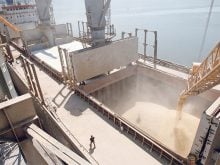BRANDON — Export deals and money are falling through the Canadian canola industry’s hands because of inadequate canola meal handling capacity on the West Coast, says Thomas Mielke of Oil World magazine.
It’s something farmers shouldn’t put up with.
“You should scream,” Thomas Mielke told a crowd at Manitoba Ag Days Jan. 17.
“There is demand out there in Asia, in China, in other countries. They need canola meal. People don’t sell. Canadian exporters don’t sell more at the moment because they cannot get freight, they cannot get space in Vancouver. And you are losing money.”
Read Also

Trump cuts off trade talks with Canada
UPDATED: October 24, 2025 – 0910 CST – Adds comments from Prime Minister Mark Carney. Reuters — U.S. President Donald…
Mielke said Canada’s logistics system has increased its capacity in recent years but not as quickly as farmers have boosted yields.
If the fundamental base of canola prices are established by the supply and demand of the seed, oil and meal, then there is a problem when inadequate export capacity clouds the true demand potential for meal .
Right now it’s not a big problem, he said, but in future years it could be. With production expanding and crushing expanding, Canada will need more and more export capacity for canola’s components of oil and meal, as well as for the seed itself.
“What about next year? You have to have the capacity (eventually) to ship 12 million tonnes of canola, which you don’t have.”
Mielke said farmers need to wake up to the situation because the markets want Canadian canola and canola products and farmers want to grow it, but the logistics system might not let the two fully connect.
“Farmers are reacting to the price signals in the world market by expanding production,” said Mielke.
“It is important that the infrastructure develop the same way.”
















